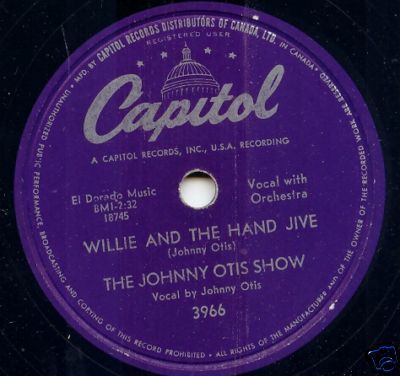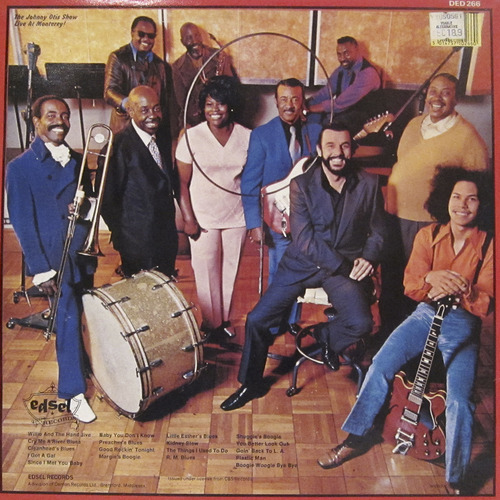It’s been more than a week since the deaths of those two giant figures of American R&B: Johnny Otis, and his greatest discovery, Etta James.
My initial comments on Otis’ death are in a post below, and they’ve both received significant media coverage, especially James, although Lynn Crosbie in the Globe & Mail this week wondered why it took her death for James to receive such wide recognition. “But if she is such a legend, why was she not pushed forward more in her life?”
There was nothing simple, or easily mainstreamed, about the way James sang. Pure soul is not easy to listen to; it is an emotional assault
And there was her constant pain, a terrible byproduct of drawing – as her admirer Amy Winehouse did – so deeply from the heart.
Otis and James met in San Francisco when she was fifteen, singing in a group with two friends. Otis was ready to take her to L.A. to record immediately, so Etta lied about her age, and forged a note from her mother (who was in jail at the time) Etta “permission” to go.
At fifteen, my professional recording career had begun.
Johnny Otis turned out to be much more than a promoter and a musician. He’s a guru, a man with an encyclopedic knowledge and appreciation of black music. He sees its wholeness, from gospel to blues to jazz… Add to his cosmic vision a street hustler’s sense of how to sell and you have some notion of his stature. Johnny’s finger was on the pulse. Some people have accused him of stealing songs — and I do believe there’s a little larceny in all of us — but basically Johnny loved the artist more than he loved the money…
I dug how Johnny Otis reinvented himself as a black man. People took his Greek shading as Creole, but Johnny took it even further; he viewed the world — and especially the musical world — through black eyes. His soul was blacker than the blackest black in Compton…. He had a genius for hip names. Johnny could name a person in a minute. Sister Soukee. Handsome Mel Walker. Little Esther. Young John Watson. Shorty Long. The Mighty Flea…. He also rechristened me [Jamesetta Hawkins]. He was the one who flipped everything around.
Two NPR features on Etta:
- a 1994 interview with Etta on NPR:
- 5 Etta songs we love.
Excerpt: Etta James’ version of “At Last” might be the strongest testament to her greatness as singer. With this song, she took a rather saccharine Tin Pan Alley melody and transformed it into one of the most soulful ballads in the history of rhythm and blues.
So, what the hell was Beyonce doing singing that song for the Obamas at that inauguration ball??
NOW review & photo of her 1992 Harbourfront concert
For some more of Etta on You Tube:
- With Dr. John, in a memorable duet of one of her greatest songs, “I’d’ Rather Go Blind”
- Also live, from 1962, “Something’s Got A Hold on Me“
- “Rock n Roll Music” at Chuck Berry’s 60th birthday
- “The Very Thought of You” (recorded)
- “God’s Song“. James recorded a number of Randy Newman’s songs, but this remains one of my favourite Etta interpretations
JOHNNY OTIS
Growing up in the 1950’s, my sister and I were only allowed to buy one record each every other month. I only remember one record my sister bought that I liked. It wasn’t like anything else I had heard at the time, but it was a great song by an artist named “The Johnny Otis Show”. I couldn’t figure that out… the only “show” I could think of was a TV show. Was there a TV show with someone named Johnny Otis?
The “show” was of course, the great travelling R&B show that Otis had been touring with since the 1940’s. I had no idea who he was or his significance. The song has however remained a favourite of mine all my life, and I eventually grew to learn a bit about Otis’s significance.
Here’s the label of that old 78RPM record. (It’s from the Internet… I haven’t kept it all these years!). I didn’t remember what record label it was on, but I clearly remember the purple label.
Again, on video: http://www.youtube.com/watch?v=qOrQTh_Cq7U
A somewhat newer release: the LP, The Johnny Otis Show Live at Monterey!. It’s a great 1970’s fashion statement!…
Otis’s appearance at the 1970 Monterey Jazz Festival helped bring him back into the (musical) public eye. And what a great performance they gave, with Johnny, son Shuggie, plus Big Joe Turner, Little Esther, Eddie “Cleanhead” Vinson, Ivory Joe Hunter, Roy Brown, Pee Wee Crayton, Roy Milton, and more.
See www.johnnyotis.com for a big selection of his music.

